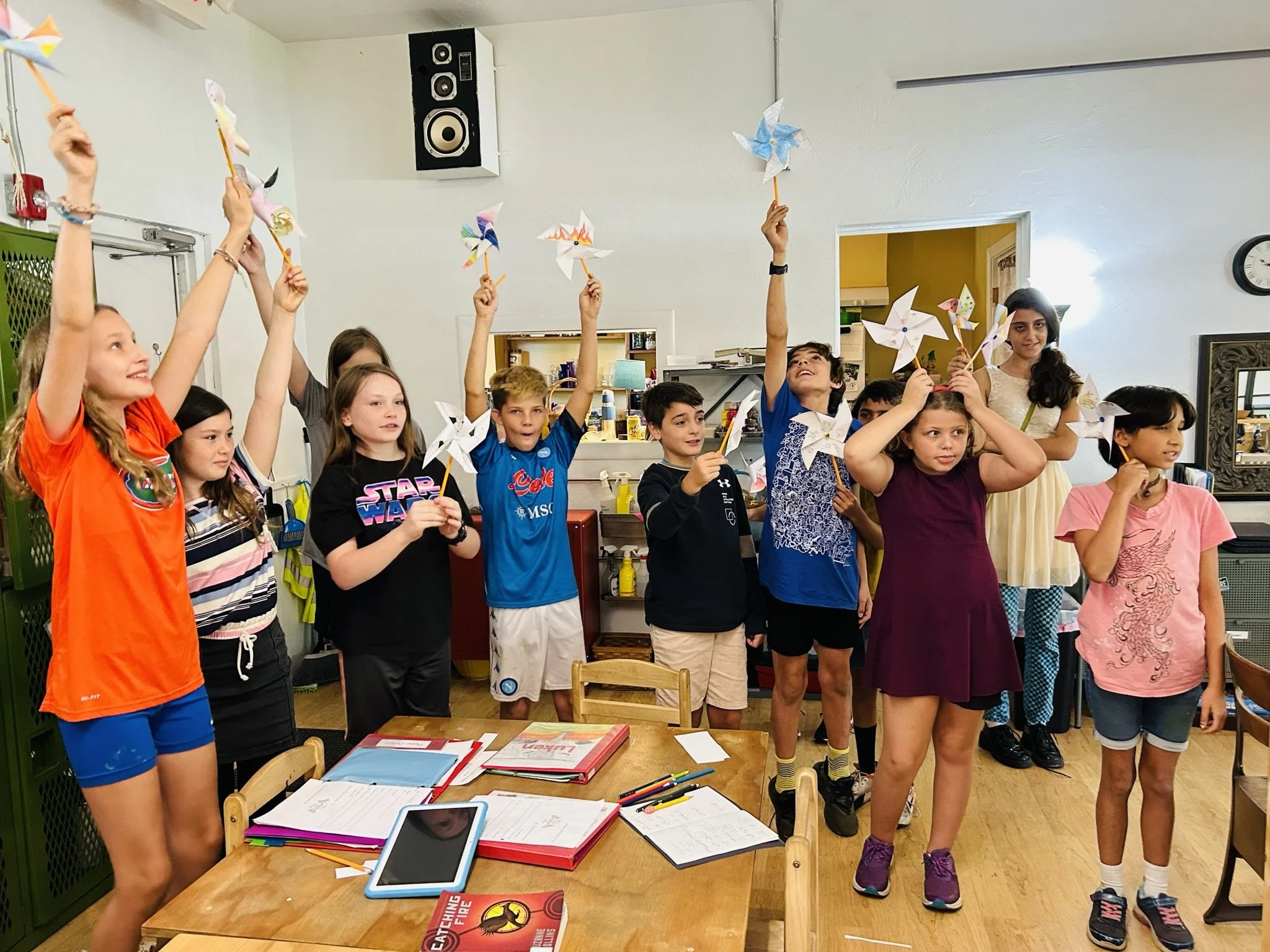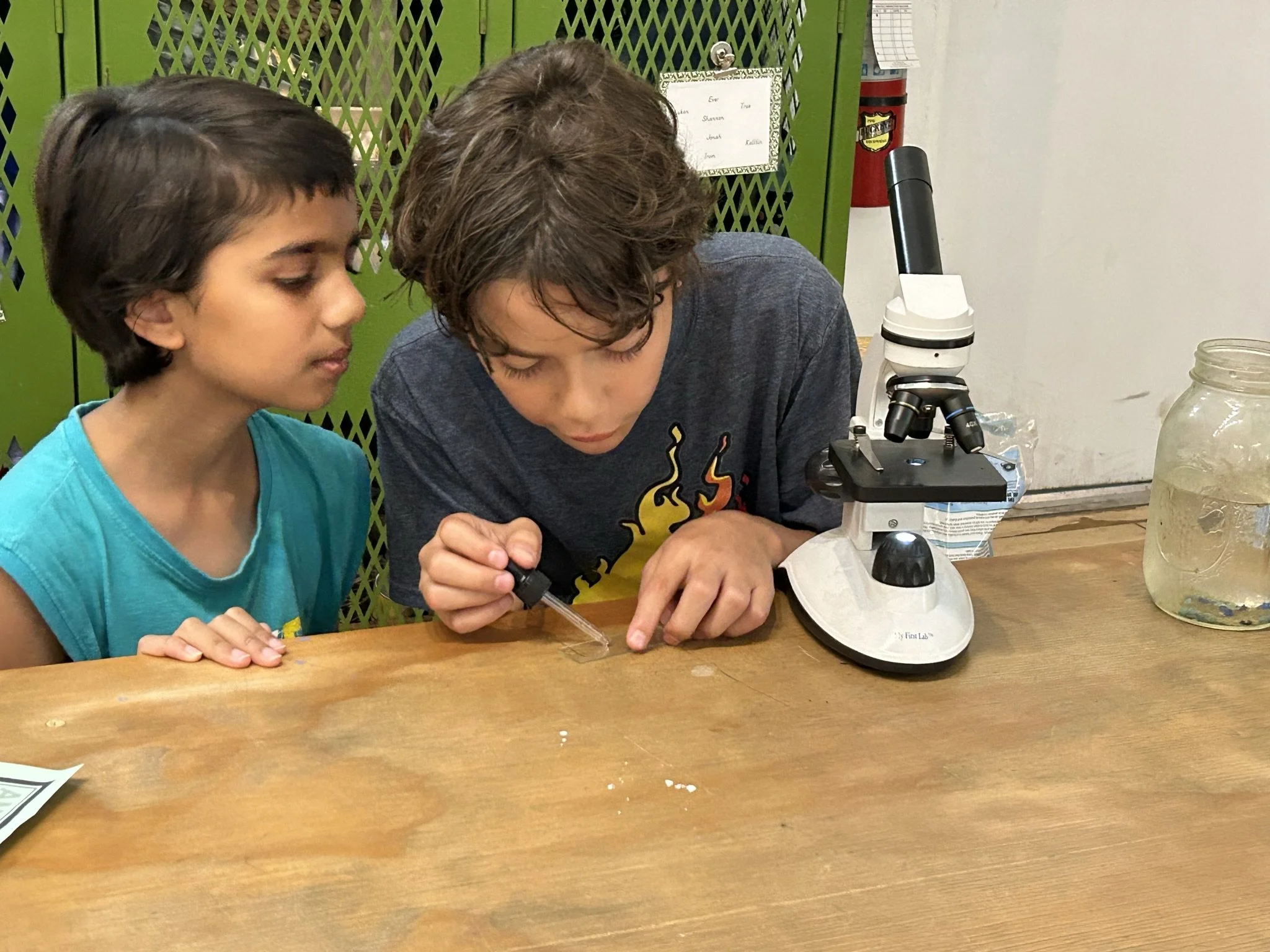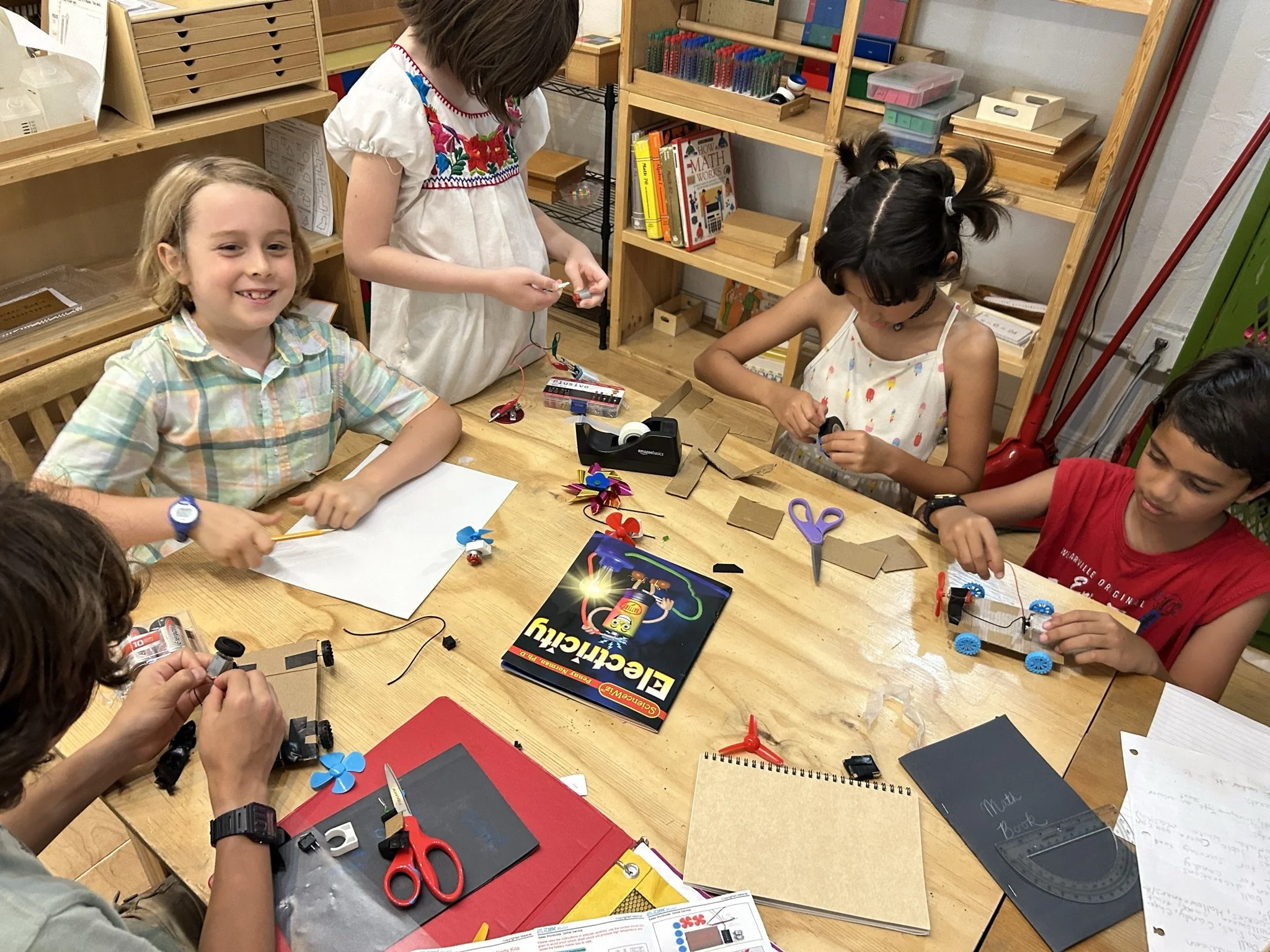Our Elementary Montessori Community
Ages 6-9 & 9-12
Our Elementary Montessori Program is divided into two levels: Lower Elementary (6-9-year-olds) and Upper Elementary (9-12-year-olds). Each level is a multi-age community where students collaborate with others of different ages and abilities, learning to accomplish a goal cooperatively. This process encourages the child to contribute ideas, listen to others, and learn to compromise.
To inspire academic excellence; nurture curiosity, creativity, and imagination; and awaken the human spirit.
Inspiring children to hard work and academic excellence
Montessori is one of the most sophisticated pre-collegiate programs available anywhere in North America. It has been described as the ultimate gifted and talented program. But this doesn’t tell the whole story. What makes Montessori special is its ability to nurture talent without needless competition and stress. In a nutshell, Montessori children never lose the joy of learning.
Montessori is first and foremost concerned with a child’s character and emotional development, rather than academics for grades and test scores alone. We are attempting to inspire children toward academic excellence and nurture the curiosity, creativity, and imagination hidden within every human being.
Sometimes parents worry that Montessori will not prepare their children for the “real world.” Hearing that we do not give children letter grades (at least until high school), assign hours of nightly homework, give children weekly tests, or expect students to compete for the highest rank in the class, they wonder if we’ve lost our minds!
Montessori elementary education is distinctly different.
Elementary Montessori classes continue to bring children of different age levels together. Classes span three age/grade levels, with the common divisions being ages 6 to 9 (grades 1-3) and ages 9 to 12 (grades 4-6). Some schools may follow a somewhat different scheme of grouping their children.
There are many reasons why Montessori classes group children of several grade levels together:
Since Montessori allows children to progress through the curriculum at their own pace, there is no academic reason to group children according to one grade level.
In a mixed-age class, children can always find peers who are working at their current level.
To accommodate the needs of individual learners, Montessori classrooms include a curriculum to cover the entire span of interests and abilities up through the oldest and most accelerated students in the class. This creates a highly enriched learning environment.
In multi-level classrooms, younger children are stimulated by the interesting work in which the older ones are engaged
At the same time, in multi-level classrooms, older students serve as tutors and role models for the younger ones, which helps them in their own mastery (we learn things best of all when we teach them to someone else) and leaves them with a tremendous sense of pride.
By working with children for three years, teachers get to know them extremely well.
And, finally, there is a strong sense of continuity in the elementary Montessori class because two-thirds of the children return each September for either their second or third year with the same teacher(s). Most of the children know one another and understand the culture of the class. This makes it much easier to orient new children to the class.
Reasoning & Abstract Thought
“Our experience with children in elementary schools has shown us that the age between six and twelve years is a period of life during which the elements of all sciences should be given. It is a period that, psychologically, is especially sensitive and might be called the "sensitive period of culture" during which the abstract plane of the human mind is organized.” Dr. Maria Montessori
Elementary children have an immense appetite for knowledge; they begin to think abstractly and they have remarkable powers of imagination. The philosophy that underlies the Montessori elementary program, known as Cosmic Education, is designed to help individuals search for their place in the universe and to recognize their relationship to other living things.
Scientific Mind
Elementary studies build knowledge through an in-depth study of the world and how it works. Studies are integrated across disciplines that include geography, biology, history, language, mathematics, science, music, and other forms of artistic expression. Exploration of each area is augmented by the children, who organize visits beyond the confines of the classroom to gain real-life knowledge from community resources, such as the library, planetarium, botanical garden, and science museums.
In our elementary classes children experience abstract concepts through concrete experience and hands-on learning materials. Critical thinking skills are enhanced as students explore and discover concepts for themselves. Learning is integrated throughout the subject areas to create an academically challenging program that meets the child’s changing developmental needs from year to year.
Students Work Independently or in Small Groups
What sets Montessori apart in the Elementary years—ages 6 – 12—is the individually paced curriculum that challenges children academically and safeguards their well-being and sense of self. Engaging as contributing members of a respectful community, they learn to question, think critically, and take responsibility for their own learning—skills that will support them in later education and in life.
Inspiring children to hard work and academic excellence
Montessori is one of the most sophisticated pre-collegiate programs available anywhere in North America. It has been described as the ultimate gifted and talented program. But this doesn’t tell the whole story. What makes Montessori special is its ability to nurture talent without needless competition and stress. In a nutshell, Montessori children never lose the joy of learning.
Forming Neuro-Connections from the Outdoor Environment to the Indoor Environment
“Our care of the child should be governed, not by the desire to make him learn things, but by the endeavor always to keep burning within him that light which is called intelligence.” Dr. Maria Montessori
Montessori is first and foremost concerned with a child’s character and emotional development, rather than academics for grades and test scores alone. We are attempting to inspire children toward academic excellence and nurture the curiosity, creativity, and imagination hidden within every human being.
Sometimes parents worry that Montessori will not prepare their children for the “real world.” Hearing that we do not give children letter grades (at least until high school), assign hours of nightly homework, give children weekly tests, or expect students to compete for the highest rank in the class, they wonder if we’ve lost our minds!
Montessori elementary education is distinctly different.
Lower Elementary: Ages 6 to 9 years
Elementary children have an immense appetite for knowledge; they begin to think abstractly and have remarkable powers of imagination. They are no longer solitary workers, focused on the self. Rather, they gravitate toward others to collaborate on work of mutual interest. A key element of “inner work” at this age involves learning how to interact and coexist peacefully with others. The elementary child has a strong sense of moral justice, which is used to navigate their increasingly socially-oriented outlook.
“Infinity Street”
"Great creations come from the mathematical mind, so we must always consider all that is mathematical as a means of mental development. It is certain that mathematics organize the abstract path of the mind, so we must offer it at an early age, in a clear and very accessible manner, as a stimulus to the child whose mind is yet to be organized." Dr. Maria Montessori
Periodic Table of Elements - Lower Elementary
“Conquering matter is to understand it, and understanding matter is necessary to understanding the universe and ourselves: and that therefore Mendeleev's Periodic Table, which just during those weeks we were learning to unravel, was poetry.” Primo Levi
Botany, Zoology, Entomology
Similar to our zoology work, children are introduced to botany activities through our science curriculum. The children start by classifying plant or animal. This introductory material lays a foundation for children to learn the basic characteristics and needs of plants. From there, children learn to name the parts of plants and trees as well as identify many types of plants and trees in their natural surroundings.
Upper Elementary: Ages 9 to 12 years
The Upper Elementary is a learning community where students collaborate with others of different ages and abilities, learning to accomplish a goal cooperatively. This process encourages the child to contribute ideas, listen to others, and learn to compromise. Older elementary children take their learning beyond the acquisition of facts and enjoy thinking and questioning. Their social orientation expands ever outward to encompass their entire community and concerns worldwide.
At the elementary level, learning continues to be a hands-on experience, as students learn by trial, error, and discovery.
The advanced elementary Montessori materials move on to more complex and abstract concepts in mathematics, geometry, and pre-algebra. The goal is to lead students away from a dependency on concrete models that visually represent abstract concepts towards the ability to solve problems with pen and paper alone. Part of this is made possible by the growing child’s brain’s ability to grasp abstractions, but it has been greatly enhanced over the years by countless hours of work with the concrete materials that made the abstract real and helped him visualize the abstraction.
Similar hands-on materials help students understand grammar, sentence analysis, geographical facts, and concepts in science.
Learning How to Learn
At the elementary level, Montessori students learn to think for themselves. They are encouraged to do their own research, analyze what they have found, and come to their own conclusions. Montessori teaches students to think, not simply to memorize, feedback, and forget. They literally learn how to learn, discovering that the process of learning can, and should, be as natural as breathing! Students become fully engaged in the learning process.
Rather than present students with all the “right answers,” Montessori teachers ask the “right questions,” and challenge them to find new solutions or discover the answers on their own. This is yet another element of the Montessori program that prepares children to succeed in the real world of ideas, enterprise, and challenging perspectives. Learning the right answers may get children through a test. Learning how to learn will get them through life!
Community Service
Children must be inspired to contribute to the betterment of the world. They often begin with projects that care for the environment, planting trees and flowers, composting garbage, controlling erosion around the campus, recycling, and cleaning up litter and debris in the local community. It is quite common for elementary classes to adopt an acre of rainforest in Costa Rica or work to support an environmental organization, such as the Wildlife Federation.
They will normally progress to projects that provide direct help to the needy. Younger children commonly collect canned goods, clothing, and toys for the homeless or needy families and their children. As they are ready, most Montessori schools will take children out into the community. Some classes spend an afternoon every week visiting a nursing home, building friendships with older people. In some schools, older elementary children volunteer in food kitchens or help care for small children in shelters for battered women. Some classes prepare lunches, which they deliver to the homeless.
As they reach the upper elementary class, it is common to find Montessori children quite concerned about issues of social justice and human rights. The rights of the poor, homeless, and hungry are often of real concern. Some children will begin to explore the possibilities of supporting causes that are meaningful to them.
Montessori schools strive to create global understanding
They tend to attract teachers from all over the world.
It is normal to find an international student body in a Montessori school anywhere in the world.
Montessori schools normally teach at least one foreign language, and commonly offer intensive programs in several languages.
World geography, international cultural studies, and world history are central to the elementary Montessori curriculum.
Elementary Montessori students begin to understand the global economy.
As more and more Montessori schools are developing strong upper elementary and middle school programs, they are beginning to sponsor travel-study programs. Some participate in the Montessori Model United Nations or even foreign exchange programs.
Gifted Learners
Montessori elementary education is distinctly different.
First, let’s talk about all of the highly selective programs for “gifted” children.
Montessori demonstrated that intelligence is common among human beings. Most schools assume that giftedness is statistically rare and that, given half a chance, children will accomplish little without external structure, extrinsic rewards, and the fear of being embarrassed.
Many of us attended challenging elementary schools. How much honestly sunk in? Do you remember what happened in your highly disciplined classrooms when your teacher left the room? In many cases, it was a disorder. What use is it to earn high grades, keep your notebook neat, pass every test, and hate your schoolwork? Many children in many good schools are bored, apathetic, or overwhelmed. They do what must be done to get along. But when the weekend comes, they party, and when the course is over, they sell their books and thank their lucky stars that they’ll never have to hear about that subject again. That is not a sound foundation for a real education. In the best schools, classrooms are filled with students who retain a sense of wonder, curiosity, and eagerness to learn. Those qualities are the almost universal description of elementary Montessori children.
The differences between the way many people think about gifted children in America and the attitudes we find abroad are quite interesting. Americans unconsciously assume that intellectual ability and scholastic success is inborn, i.e. a child is born with special talents and abilities. Many parents in other countries assume that success is more the result of hard work, self-discipline, and high personal motivation.
Montessori demonstrated that intelligence has many forms, and children learn in different ways at different paces. Anyone who has worked with children knows this is true. But schools normally follow a pre-established curriculum.
Montessori felt it was illogical to dismiss a child who finds it difficult to memorize facts without understanding, or to remember what the teacher covers in a lecture.
She also understood the powerful connection between a child’s inner emotional life, self-confidence, and a sense of self-esteem, and the ability to learn.
A Montessori elementary program is based on warmth, kindness, and respect. There is a strong sense of community among the children. The classes are more like little villages, with powerful friendships and a clear sense of group identity. Teachers are normally seen as mentors and friends.
In summary, the habit of academic excellence stems from a strong sense of self-confidence, a joyful approach to life, and deeply held core values. When held as a basic value, a passion for excellence allows children to develop their full potential and to achieve amazing things!








